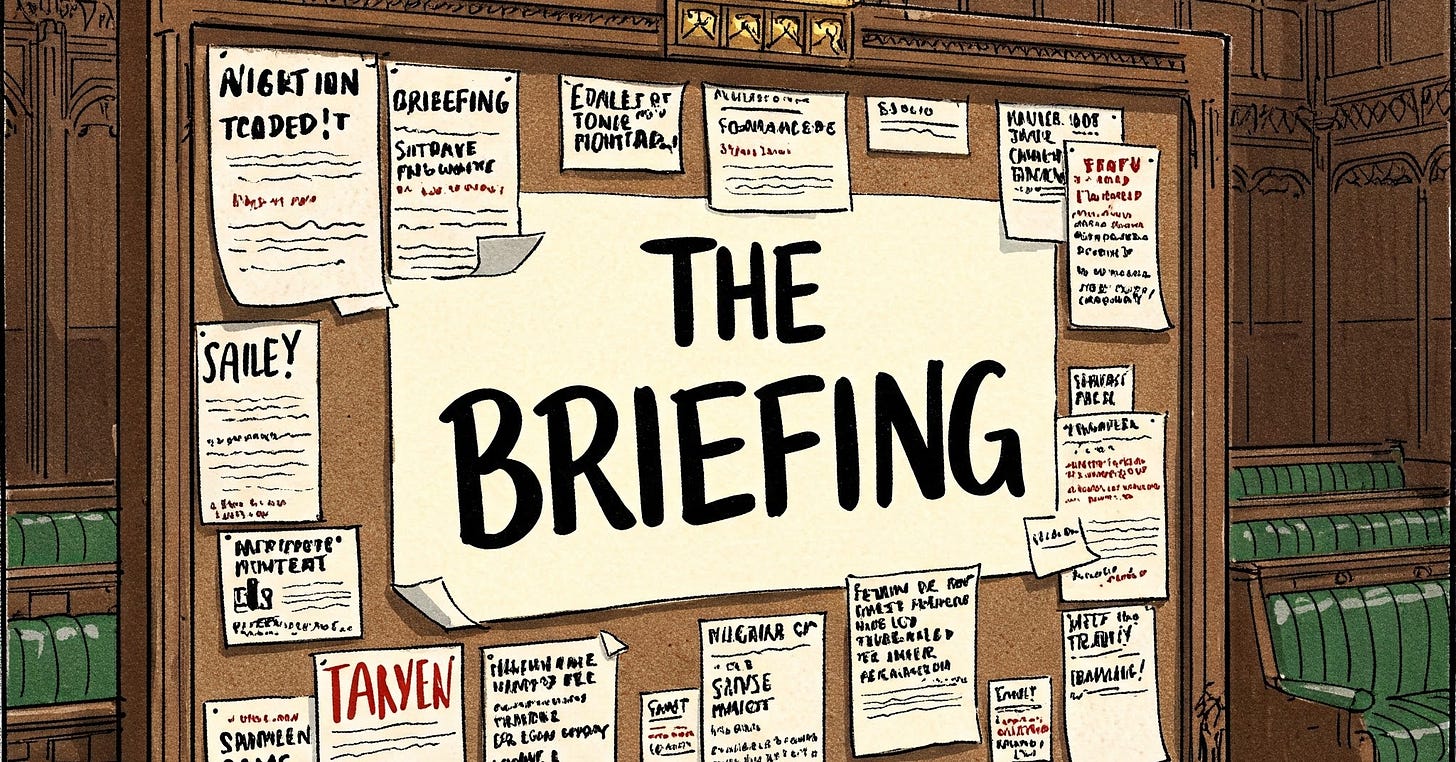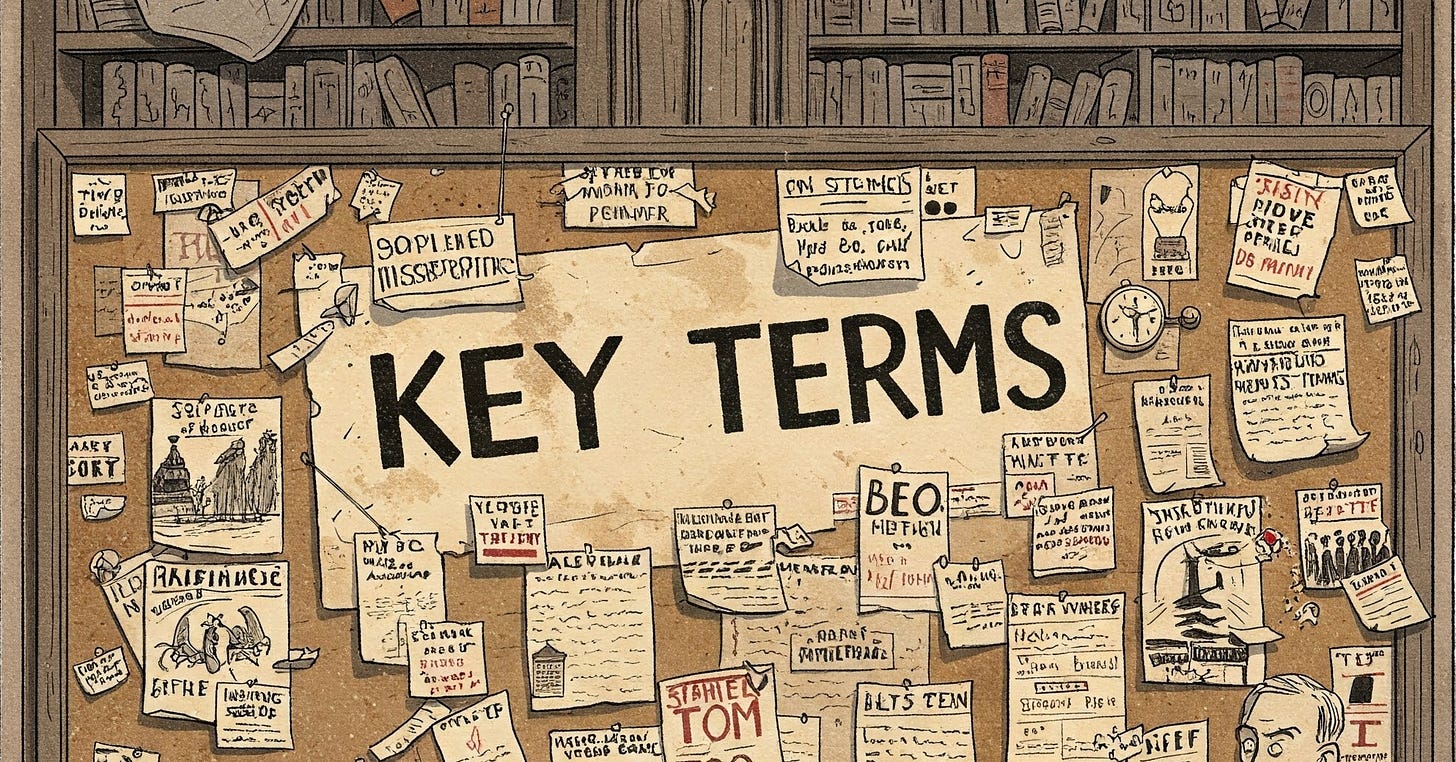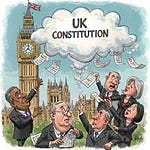Hello again Benchwarmers!
Understanding how the UK is governed can sometimes feel like navigating a maze. But at the heart of it all lies the UK Parliament. It's where laws are made, government actions are scrutinised, and the future of the country is debated. Knowing how Parliament works is crucial for any engaged citizen.
This second edition of our extended shownotes on the UK Constitution explores the powers and processes of the UK Parliament.
Sharpen your political punditry skills by never missing extended shownotes from The Bench Report. You'll be a guest on ‘Newsnight’ in no time.
Decoding the UK Parliament: Its Structure and Influence
The UK Parliament is a cornerstone of the UK constitution, and its very existence "results from the exercise of royal prerogative". Known as the King or Crown "in Parliament", it's made up of "the Sovereign, the House of Lords and the House of Commons". It's the main law-making body for the entire UK on matters that aren't specifically handled by the devolved governments of Scotland, Wales, and Northern Ireland, although it can also legislate in those devolved areas, usually with their agreement. Interestingly, the UK Parliament itself is a "reserved matter," meaning the devolved governments can't legislate on its powers.
The UK Parliament has evolved over time. Its official "style" became the "Parliament of the United Kingdom of Great Britain and Northern Ireland" in 1927. A new Parliament starts after each general election, and the one elected in July 2024 is the "59th Parliament of the United Kingdom". Each Parliament is typically divided into "sessions" that last about a year. The government decides when Parliament will sit, with breaks (recesses) agreed by both the House of Lords and the House of Commons. Interestingly, Parliament can even hold proceedings in a "hybrid (virtual) form".
When it comes to the physical space of Parliament in the Palace of Westminster, the Speakers of each House have control over their respective areas. Westminster Hall, however, is jointly overseen by the Lord Great Chamberlain (representing the Monarch) and both Speakers. The "crowned portcullis" is the official symbol of the UK Parliament, authorised by Queen Elizabeth II in 1997. To encourage younger voices, the UK has had an elected "UK Youth Parliament" since 1999, giving young people a way to influence what happens in Parliament.
One of the most fundamental principles governing Parliament is "parliamentary sovereignty" or "parliamentary supremacy". As A. V. Dicey famously put it, this means Parliament has the "right to make or unmake any law whatever," and no other person or body can override or ignore its laws. This principle is even recognised in law. Many of Parliament's powers come from "parliamentary privilege," which grants special immunities, exemptions, rights, and powers to each House and its members. A key protection for parliamentary proceedings is Article IX of the Bill of Rights, which ensures that freedom of speech and debates in Parliament cannot be challenged in any court outside of Parliament . A similar protection exists in the "Scottish Claim of Right 1689" .
Don’t forget to head to the podcast website to listen to this episode on the platform of your choice. Follow to receive new episodes as soon as they are released.
Parliament has the power to "dissolve" itself, although it's more common for it to be dissolved by a royal proclamation on the advice of the Prime Minister . The Dissolution and Calling of Parliament Act 2022 sets out the rules for dissolution . Parliament is "prorogued" (formally ends a session) by the Crown on the Prime Minister's advice through a Prerogative Order in Council . The Prime Minister has a "constitutional responsibility" to consider Parliament's interests when advising on prorogation . A new parliamentary session begins with the "King in state," a traditional event where the "King's Speech," outlining the government's plans, is delivered . While historically Parliament could "impeach" individuals, this hasn't happened since 1806 . The "House of Commons" holds specific power over "finance," as financial bills must start there . Parliament keeps an eye on the government through various methods like "Commons Select Committees, Parliamentary Questions, oral and written statements, and debates" . It can even declare that the government is in "contempt of Parliament" . The "Parliament Acts 1911 and 1949" allow certain public bills to become law even without the full agreement of the House of Lords , and the courts are willing to review the legality of Acts passed using this process .
Laws are primarily made by the "King in Parliament" . When a new law (bill) is proposed, it needs a "statement of compatibility with the European Convention on Human Rights" . Generally, government business takes "precedence" in the House of Commons . A typical bill goes through several stages in both Houses: "first reading, second reading, committee stage, consideration on report, and third reading" . Before a formal bill is introduced, there's often "pre-legislative scrutiny" where parliamentary committees examine draft versions . For a bill to become an official Act of Parliament, it requires "Royal Assent," the formal approval of the Sovereign .
Besides primary legislation, Parliament also deals with "Delegated Legislation (Statutory Instruments)". The Statutory Instruments Act 1946 defines what a "Statutory Instrument" (SI) is and sets out how they should be presented to Parliament . Parliament has ways to review and sometimes cancel these Statutory Instruments .
The relationship between the Crown and Parliament is intertwined. As mentioned, Parliament's "legal existence results from the exercise of royal prerogative", and the "King or Crown in Parliament" includes the Sovereign. Every piece of parliamentary legislation needs the Sovereign's formal approval, "Royal Assent" . The Crown communicates with Parliament through specific phrases like "King's pleasure" (for example, when instructing the Commons to elect a Speaker) and "King's recommendation" (for public spending not included in regular estimates) . However, Parliament has a rule that no question can directly involve the "Sovereign's name or influence" in a critical way, or reflect poorly on the Sovereign or the Royal Family .
Finally, while the UK Parliament has the authority to legislate on any matter, the "Sewel Convention" states that it "does not normally" legislate on devolved issues without the consent of the relevant devolved legislature . This convention is "recognised" in law but isn't legally binding . Similarly, questions about devolved matters usually can't be asked in the UK Parliament, with some exceptions .
Glossary of Key Terms
Royal Prerogative: The historical powers and privileges belonging to the Monarch.
Parliamentary Sovereignty: The principle that Parliament is the highest law-making body and its laws cannot be overturned by any other authority.
Primary Legislation: Acts of Parliament; the main form of law.
Delegated Legislation (Statutory Instruments): Laws made by government ministers under powers granted to them by an Act of Parliament.
Royal Assent: The Monarch's formal approval required for a bill to become an Act of Parliament.
Prorogation: The formal end of a parliamentary session.
Dissolution: The ending of a Parliament, followed by a general election.
Sewel Convention: A convention stating that the UK Parliament will not normally legislate on devolved matters without the consent of the devolved legislature.
Parliamentary Sources
The United Kingdom constitution
Research Briefing
Published 23 April, 2025
Questions and Answers
Where does the UK Parliament get its authority? The legal basis of the UK Parliament "results from the exercise of royal prerogative".
Who are the key players in the UK Parliament? It is composed of "the Sovereign, the House of Lords and the House of Commons".
Can the UK Parliament make any law it wants? Yes, due to the principle of "parliamentary sovereignty," Parliament has the "right to make or unmake any law whatever".
What is the role of the King in the law-making process? All parliamentary legislation requires formal approval by the Sovereign through "Royal Assent" . The Monarch also opens each parliamentary session with the "King's Speech" .
How does the UK Parliament oversee the government? Through mechanisms like "Commons Select Committees, Parliamentary Questions, oral and written statements, and debates" .
Politics is everyone’s business. Know someone who will benefit from knowing more about this issue? Please share The Bench Report with them.
What you can do.
If you want to understand a new UK law, try to trace its journey through Parliament to see the different stages of scrutiny it underwent.
Pay attention to debates and reports from Parliamentary Committees to gain deeper insights into specific policy areas.
Consider looking up Statutory Instruments related to laws you're interested in, as these often contain the detailed practical rules and regulations.
Join the campaign!
Find us on socials: X / Bluesky / Facebook / Instagram
Shape our next episode! Get in touch with an issue important to you - I’ll grab another coffee and start the research.
Email: thebenchreportuk@gmail.com
Subscribe for free to stay connected, never miss extended shownotes and astound your friends at dinner parties.

















Share this post